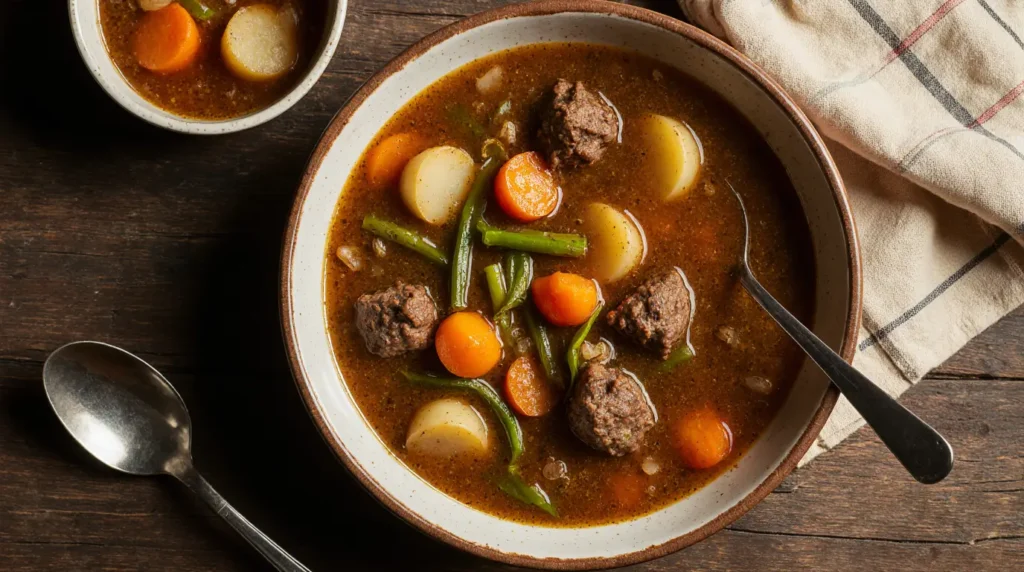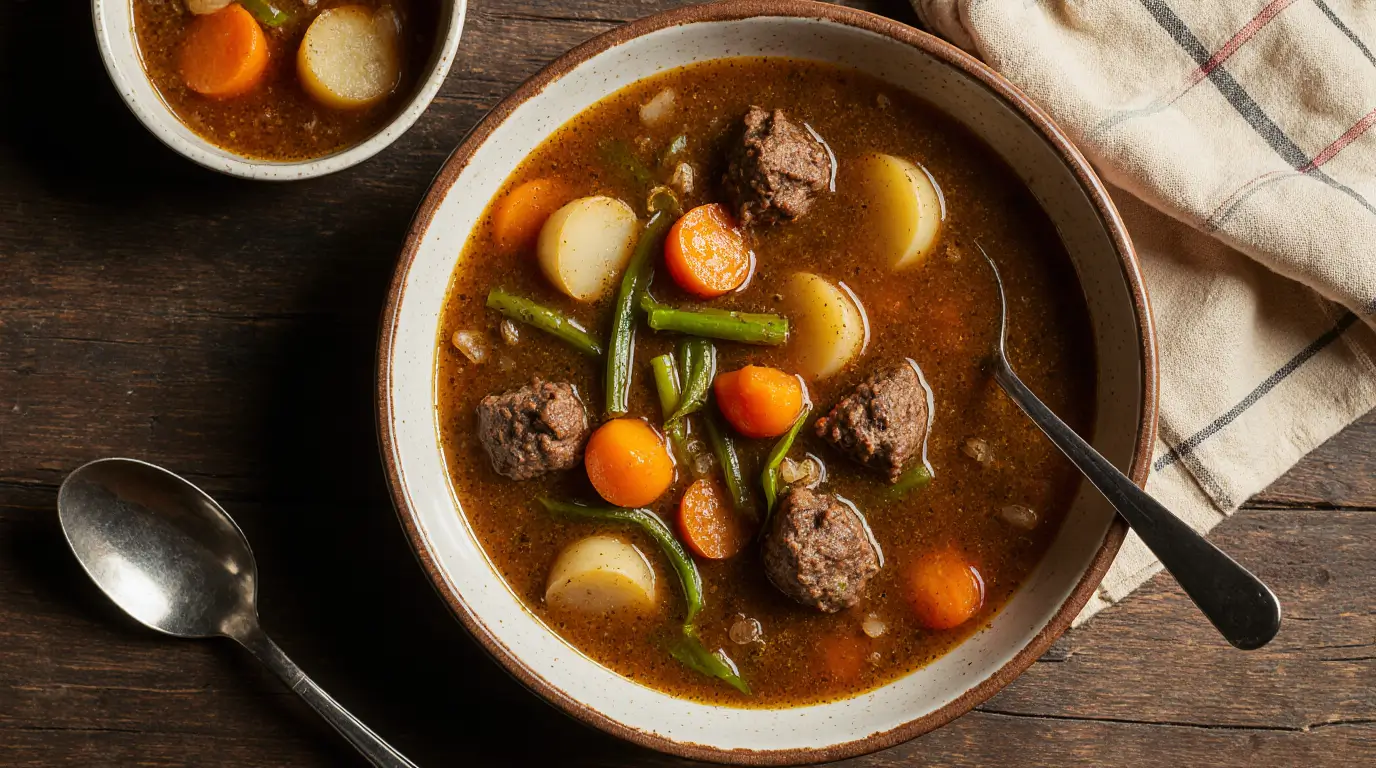
Looking for a tasty and quick meal? Try our homemade vegetable beef soup, ready in just 30 minutes. It’s a hearty recipe that turns simple ingredients into a nutritious dinner that warms you up.
Busy professionals and home cooks alike will love this soup. It packs a punch of flavor without needing to spend hours cooking. You’ll use common ingredients you probably have at home.
This soup is a great mix of protein and veggies, making it a full meal. Learning this easy recipe means you’ll have a comforting dish that your family will love.
The best part about this soup is how easy and flexible it is. You can change up the ingredients based on what you have, making it perfect for any weeknight dinner.
The Appeal of Vegetable Beef Soup
A hearty vegetable beef soup is more than a meal. It’s a warm hug in a bowl. This soup offers comfort and nutrition for all ages and backgrounds.
This soup’s charm comes from its versatility and emotional tie to home cooking. It’s a dish that wins hearts and fills bellies.
Comfort Food for Everyone
Vegetable beef soup is more than food. It’s a way to bring families together. It creates memories around a pot of warmth and flavor.
- Reminds you of grandmother’s kitchen
- Provides instant emotional comfort
- Suitable for all age groups
Nutritional Benefits
Every spoonful is a nutritional boost. Lean beef and fresh veggies make a balanced meal. It’s packed with essential nutrients.
| Nutrient | Benefits |
|---|---|
| Protein | Muscle development and repair |
| Vitamins | Immune system support |
| Minerals | Energy metabolism |
Great for Meal Prep
Busy people will love how this soup fits into meal prep. Cook once, enjoy multiple times is your new motto.
“A good soup is the foundation of happiness” – Ancient Cooking Wisdom
With little effort, make big batches. Store them in the fridge or freezer. This way, delicious meals are always ready.
Ingredients You’ll Need
Making the perfect vegetable beef soup begins with choosing top-notch ingredients. Your easy vegetable beef soup recipe needs the right parts for great taste and health.
Fresh Vegetables That Make a Difference
The right veggies can turn your soup into something special. Fresh veggies add lively flavors and important nutrients to your soup.
- Carrots: Sweet and crunchy
- Celery: Adds delicate flavor
- Onions: Provides depth
- Potatoes: Hearty and filling
Choosing the Perfect Beef
The meat is the core of your soup. For an easy vegetable beef soup, lean ground beef is best. It cooks fast and offers plenty of protein without too much fat.
| Beef Cut | Cooking Time | Fat Content |
|---|---|---|
| Lean Ground Beef | 10-15 minutes | 90% lean |
| Chuck Roast | 2-3 hours | 20-25% fat |
Herbs and Spices that Elevate Flavor
Your choice of seasonings can make or break the soup. A mix of herbs can turn simple ingredients into a memorable dish.
- Dried Basil: Brings Mediterranean flair
- Garlic Powder: Adds depth
- Black Pepper: Provides warmth
- Thyme: Earthy undertones
Pro tip: Fresh herbs can be substituted for dried, but adjust quantities accordingly.
Essential Cooking Tools
Preparing a delicious vegetable beef soup stovetop needs the right kitchen equipment. The right tools make cooking fun and easy. Let’s look at the key items for a perfect homemade vegetable beef soup
 Starting a tasty soup begins with the right tools. Your kitchen will be ready for a smooth cooking experience.
Starting a tasty soup begins with the right tools. Your kitchen will be ready for a smooth cooking experience.
Large Pot or Dutch Oven: The Heart of Your Soup
A good large pot or Dutch oven is key for your homemade vegetable beef soup. These pots offer:
- Even heat distribution
- Enough room for ingredients
- Deep sides for simmering
Precision Cutting Tools
Your vegetable beef soup stovetop method needs sharp tools for perfect prep:
- Cutting board: A sturdy surface for chopping vegetables
- High-quality chef’s knife for precise cuts
- Sharp paring knife for detailed work
Serving Essentials
Finish your soup prep with the right serving tools:
- Large ladle for easy soup serving
- Soup spoons for comfortable eating
- Soup bowls with enough room
Pro tip: Invest in quality tools that will last through many soup-making adventures!
With these essential cooking tools, you’ll be ready to make a delicious homemade vegetable beef soup. It will surely impress your family and friends.
How to Prepare the Beef
Preparing the beef is key to making the best vegetable beef soup. The right method can turn a simple soup into a classic that everyone will enjoy.
Choosing the Right Cut
Choose beef cuts that are full of flavor and tender. For your soup, consider these top options:
- Ground beef (80/20 lean-to-fat ratio)
- Chuck roast, cubed
- Sirloin tips
Browning the Meat
Browning is crucial for rich flavors in your soup. Follow these steps for perfect browning:
- Heat a large skillet over medium-high heat
- Add beef in small batches to avoid overcrowding
- Cook until a deep golden-brown crust forms
- Drain excess fat
Seasoning Techniques
Boost your soup’s flavor with the right seasoning. Here’s a guide to seasoning your beef:
| Seasoning | Amount | Best Used With |
|---|---|---|
| Salt | 1 tsp | All beef cuts |
| Black Pepper | 1/2 tsp | Ground beef |
| Garlic Powder | 1 tsp | Chuck roast |
| Dried Thyme | 1/2 tsp | Sirloin tips |
Pro tip: Season the beef before browning for a deeper flavor in your soup.
Chopping the Vegetables
Preparing vegetables is key to making a tasty vegetable beef soup. The right chopping can make your soup amazing. It ensures every bite is full of flavor and just right.
Picking the right vegetables is crucial for a great soup. Not all veggies are good for soup.
Recommended Vegetables for Your Soup
- Carrots: Sweet and hearty
- Celery: Adds subtle depth
- Onions: Foundational flavor
- Frozen mixed vegetables: Convenient and consistent
- Corn: Provides sweetness and texture
Dicing Techniques That Make a Difference
Uniform size is important when chopping veggies for your soup. Cut them into 1/2 inch pieces for even cooking. Use sharp knives and a stable cutting board for professional-looking results.
Why Vegetable Size Matters
The size of your veggie pieces affects cooking time and soup texture. Smaller pieces cook faster and mix better in the soup. For the best soup, aim for consistent, bite-sized chunks. They will cook evenly and give a perfect feel in every spoonful.
Pro tip: Always prep your vegetables before starting to cook to streamline the soup-making process.
Cooking the Soup Base
Making a tasty hearty vegetable beef soup begins with a great soup base. The key to a good soup is building layers of flavor. This turns simple ingredients into a meal you’ll remember.

Sautéing for Maximum Flavor
The secret to the best vegetable beef soup recipe is sautéing right. Start by heating your pot and making a rich flavor base. Here’s how:
- Use medium-high heat to brown ingredients
- Sauté onions until translucent and slightly caramelized
- Allow beef to develop a deep golden-brown crust
Building a Robust Broth
Your broth is the heart of the hearty vegetable beef soup. Choosing the right liquid and ingredients is key:
| Ingredient | Purpose | Recommended Amount |
|---|---|---|
| Beef Broth | Primary Liquid Base | 4-6 cups |
| Tomato Sauce | Add Depth and Acidity | 1 cup |
| Herbs | Enhance Flavor Profile | 2-3 tablespoons |
Layering Flavors Strategically
Building flavor is an art, say professional chefs. Start by deglazing the pan with broth to get those delicious browned bits. Slowly introduce ingredients, so each adds its own taste to the soup.
“Good cooking is about layering flavors and letting ingredients speak for themselves.” – Chef Michael Smith
Bring your mixture to a gentle boil, then lower the heat. Let the soup simmer slowly. This way, all ingredients blend together, making a rich, comforting meal that warms you up.
Combining Ingredients
Making a classic vegetable beef soup is all about mixing ingredients right. It’s when you put everything together in one pot that magic happens. This turns simple ingredients into a tasty meal.
- Start by adding your browned beef to the pot
- Layer in chopped fresh vegetables
- Pour in beef broth and tomato sauce
- Sprinkle in additional seasonings
Mixing the Beef and Vegetables
Mix your meat and vegetables gently to spread flavors. Use a large spoon or wooden spatula. This makes sure every ingredient is well mixed into the soup.
Cooking Times for Best Flavor
Being patient is key to getting rich soup flavors. Let your ingredients simmer slowly. This slow cooking breaks down proteins and releases deep flavors.
Importance of Simmering
Simmering is the secret to a great soup. Keep the pot at a low, steady temperature. This lets flavors grow and ingredients get tender, making the soup unforgettable.
“Good soup is one of the prime ingredients of good living.” – Louis P. De Gouy
Adjusting Consistency
Making the perfect vegetable beef soup is more than just picking the right ingredients. It’s about getting the texture just right. Your soup might need a tweak to get that perfect feel.
Getting the soup’s thickness just right is an art. If it’s too thin, it feels watery. But if it’s too thick, it’s more like a stew.
Thickening Techniques for Your Soup
- Cornstarch slurry: Mix 1 tablespoon cornstarch with 2 tablespoons cold water
- Flour roux: Blend equal parts flour and butter before adding to soup
- Puréed vegetables: Blend some cooked vegetables to naturally thicken
- Instant potato flakes: A quick way to add body to your vegetable beef soup
Balancing Liquid and Solids
The secret to a great vegetable beef soup is in the mix. Too many solids make it heavy. Too much liquid makes it bland.
| Consistency Goal | Liquid Adjustment | Solid Ingredient Action |
|---|---|---|
| Too Thin | Reduce broth | Add more vegetables |
| Too Thick | Add more broth | Remove some solids |
Texture Perfection Tips
When making easy vegetable beef soup, simmering is crucial. Cooking it slow helps the flavors blend and thickens the soup. Stir now and then and taste as you go to get it just right.
Pro tip: Let your soup rest for 10-15 minutes after cooking. This allows flavors to develop and the texture to settle naturally.
Flavor Enhancements
Turning a good vegetable beef soup into a great dish is all about flavor. The best recipe isn’t just about what you put in. It’s about creating layers of taste that excite your senses.

To make your soup taste amazing, you need to be creative with seasonings. Even small changes can make a big difference. Skilled cooks know this trick well.
Fresh Herbs to Intensify Flavor
- Fresh thyme adds earthy warmth
- Chopped rosemary brings robust pine-like notes
- Parsley provides bright, fresh undertones
- Basil creates unexpected depth
Unexpected Seasoning Secrets
Surprising ingredients can make your soup even better. Soy sauce adds a deep umami flavor. Molasses brings a hint of sweetness.
Condiment Magic for Depth
- Worcestershire sauce creates rich undertones
- Balsamic vinegar adds tangy complexity
- Dijon mustard brings subtle heat
Pro tip: Add a splash of white vinegar just before serving. It brightens the whole soup’s taste. These small changes can turn a simple soup into a memorable meal.
Storing and Reheating
After making a tasty slow cooker vegetable beef soup, it’s important to know how to store and reheat it. This way, you can enjoy your meal for days. Proper storage keeps the soup’s flavor and nutrients while avoiding food safety problems.
Best Practices for Storage
Here are simple steps to safely store your vegetable beef soup:
- Use air-tight containers to keep it fresh
- Refrigerate it within two hours of cooking
- Store in glass or plastic containers with tight lids
- Keep it refrigerated for 3-4 days max
Safe Reheating Techniques
When reheating your slow cooker vegetable beef soup, follow these steps:
- Reheat it to an internal temperature of 165°F
- Stir it occasionally for even heating
- Use a stovetop or microwave for best results
- Avoid reheating it too many times to keep it quality
Freezing for Future Meals
Freezing vegetable beef soup is a great way to save it for later. Pro tip: Leave about an inch of space at the top for expansion during freezing. Your soup can be safely frozen for up to one month, keeping its flavor and texture.
To enjoy your frozen soup, thaw it in the fridge overnight. Then, reheat it thoroughly before serving. This way, your vegetable beef soup will taste as good as when you first made it.
Serving Suggestions
Turning your hearty vegetable beef soup into a memorable meal is all about the right sides. The right pairings can make your soup go from good to great. It becomes a feast that pleases both your taste buds and your senses.
Pairing with Bread
The perfect bread can make your classic vegetable beef soup a complete meal. Here are some top bread picks:
- Crusty sourdough with a crisp exterior
- Warm cornbread with a slightly sweet flavor
- Rustic whole grain bread for added nutrition
- Garlic toast for an extra flavor punch
Perfect Sides to Complement Your Soup
Adding these sides makes your hearty vegetable beef soup a full dining experience:
- Fresh garden salad with light vinaigrette
- Roasted seasonal vegetables
- Crisp green beans with almonds
- Simple mixed green salad
Garnishes that Impress
These garnishes can boost your soup’s flavor and look:
- Fresh chopped parsley
- Grated sharp cheddar cheese
- Crispy bacon bits
- Dollop of sour cream
- Chopped chives
“A great soup is like a warm hug for your taste buds!” – Chef Marcus Rodriguez
With these serving tips, your classic vegetable beef soup will go from simple to unforgettable.
Variations of Vegetable Beef Soup
Your delicious vegetable beef soup can be more than just one recipe. You can try new ingredients and flavors from around the world. This lets you make the soup your own, adding more to it or trying new tastes.
Adding grains like pearl barley or small pasta can make your soup better. Quinoa, brown rice, and orzo make it more filling. If you want a vegetarian option, use lentils, tofu, or tempeh instead of beef.
Global flavors can give your soup a unique twist. An Italian version might add oregano, basil, and Parmesan. An Asian version could include ginger, soy sauce, and star anise. These changes show how versatile vegetable beef soup can be.
Being creative with vegetable beef soup can lead to amazing dishes. The trick is to mix flavors well and keep the soup comforting. This way, you can make it your own while keeping it cozy.

